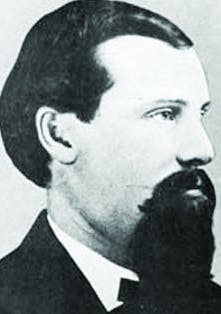This month’s Legendary Lawman column came about through the reading of several books on Montana’s gold rush history. Several of these books are listed as fictional but contained just enough historical fact to force me to dive deeper into the subject. Most notably is Frederick Allen’s 2004 book, "A Decent, Orderly Lynching: The Montana Vigilantes." As usual in the case of old west history, opinions differ on the “truth”. What is most interesting about Henry Plummer is that his life has been more thoroughly examined in the late 20th Century than it was just following his death. Some feel he was an honorable lawman and his reputation was attacked through innuendo and rumor for political reasons. Others claim he was a member of a lawless bunch that set out to steal from prospectors.
William Henry Handy Plumer was born in Addison, Maine sometime in 1832 to Jeremiah and Elizabeth (Handy) Plumer, he was one of eight children (or six or seven... tough to say). By all accounts he was well educated and came from a family background of seaman. The adult males (father, brothers and brother-in-law) were all sea captains. Henry was expected to follow in these footsteps but due to his slight build he was not physically suited to the rigors of the sea. This was an enormous disappointment to his family and probably an embarrassment to Henry. With the death of his father while Henry was in his teens the family fortune began to dissolve. This was all the push he needed, so he decided to follow a group that left Maine in search of gold out west.
On 27 April 1852, the nineteen-year-old sailed from New York aboard the U.S. mail ship Illinois to Aspinwall, Panama. From there he traveled by mule until he boarded the Golden Gate up the coast to San Francisco, California. On May 23rd he completed his coast-to-coast journey without incident and without a dollar to his name. Several accounts put young Mr. Plummer (no mention on when he changed the spelling of his last name) at work in a bakery. This lasted only until he had enough to follow his thirst for adventure and run off to the gold fields. Apparently he must have done well, as a year after arriving in California he had obtained a ranch and a mine outside the county seat of Nevada City. Trading shares in the mine for a local business, the Empire Bakery, he was now a respected member of the community.
Two years after the purchase of the Empire Bakery, Plummer was persuaded to run for town sheriff and city manager. At this time Nevada City was the third largest city in the state and being a politician was much more to Plummer’s taste than working a bakery. He was elected the Nevada City town marshal in 1856, making him the only lawman for miles. After re-election in 1857 Plummer had a run in with a miner names John Vedder. Apparently our young marshal was having an affair with Vedder’s wife and when Vedder discovered this he called Plummer out. Plummer shot him dead in the street without much effort.
While many saw the shooting as a “fair” fight the case eventually went to the California Supreme Court. Plummer was found guilty of second-degree murder and sentenced to ten years in San Quentin in February 1859. Being of ill health (some claim he had tuberculosis) and still having some political clout (many residents petitioned the Governor to stay his sentence), Plummer was released from jail on August 16, 1859. While his reputation was tarnished, many believed Henry Plummer to be a trustworthy man of the law. So, in May of 1863 Plummer was elected sheriff of Bannack, Montana.
Some said that Plummer’s election had the opposite reaction intended. They claim that the crime rate in Bannack increased markedly after Plummer took office and that more than 100 citizens were murdered in the following months. Plummer’s deputies were commonly called the “Innocents”. Some citizens in Bannack, Virginia City and nearby Nevada City formed the Vigilante Committee (aka Montana Vigilantes) to “investigate” the increase in crime. If this was the case or that there intent was to run Plummer out of office, we will never know. Shortly thereafter, suspected outlaws began getting late night visits from masked men. Posters began showing up around town with a skull-and-crossbones and the “mystic numbers” 3-7-77. There are so many theories regarding these numbers I don’t have space to investigate them here.
When the vigilantes got around to hanging twenty-four men, Plummer spoke out that they were all denied due process. When one of the accused fingered Henry Plummer as the gang leader it was all they needed to go after him. Vigilantes decided that Plummer was in fact the gang leader (without trial) and on January 10, 1864 some seventy-five men hung Henry Plummer and two of his deputies, Buck Stinson and Ned Ray, from the very gallows that had been erected by Plummer. Several accounts claim that the men were not hung with the knot to the side and dropped which was the custom to produce a quick and painless death, but with the knot to the back and hoisted, thereby causing a long, slow, suffocation.
Some three years after Plummer’s execution, the Vigilantes virtually ruled all the mining districts. There was no concrete evidence that Plummer had commited any crime in Bannack and several citizens, including the Territorial Governor, Thomas Meagher, would speak out against the Vigilantes. Some even claimed that the committee perpetrated the crime spree themselves.
Finally, on May 7, 1993 - Sheriff Henry Plummer received his trial. The Twin Bridges Public School District requested a posthumous trial. Presided over by Judge Barbara Brook, the 12 registered voters who made up the jury were split on the verdict 6-6. The mistrial would have resulted in Sheriff Henry Plummer being released as a free man. For a man who isn’t that well known, I’ve run into dozens of texts regarding the events surrounding his life. If you’re interested in further discovery on this subject try Google and be prepared to sift through an enormous amount of information.
About The Author:
Charles Bennett was born in our Nation's Capital and grew up in the Maryland suburbs. Mr. Bennett has been working in all aspects of the publishing industry since the late 1980s primarily in the fields of commercial photography and magazine production. Moving to California in 1992 to attend college resulted in B.F.A and Masters degrees. California also supplied Mr. Bennett with his wife. The two of them are avid sports persons and participate in shooting, scuba diving, surfing, running and bicycling. As a long time hobby Mr. Bennett has studied the legends of American law enforcement which led to his writing these columns.

Charles Bennett
Charles Bennett was born in our Nation's Capital and grew up in the Maryland suburbs. Mr. Bennett has been working in all aspects of the publishing industry since the late 1980s primarily in the fields of commercial photography and magazine production. Moving to California in 1992 to attend college resulted in B.F.A and Masters degrees. California also supplied Mr. Bennett with his wife. The two of them are avid sports persons and participate in shooting, scuba diving, surfing, running and bicycling. As a long time hobby Mr. Bennett has studied the legends of American law enforcement which led to his writing these columns.



